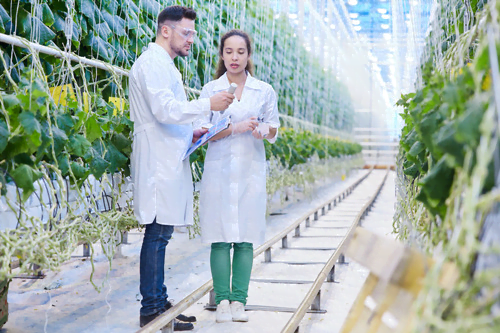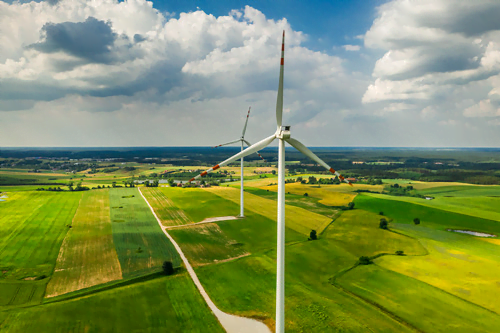
INTRODUCTION
According to the World Bank, agriculture is responsible for up to 30% of the world’s greenhouse gas emissions. The farming industry generates these emissions through various means such as transportation, the cultivation, harvesting, and processing of crops as well as livestock production. Additionally, the use of pesticides, herbicides, and fertilizers in agriculture leads to water pollution.
Undoubtedly, there is a pressing need to decrease agriculture’s ecological footprint while simultaneously increasing productivity to sustain a rising global population. The world’s population stands at 7.7 billion and is anticipated to increase to 9 billion by 2050. Unfortunately, expanding urban areas and climate change are causing a decline in available agricultural land. As per the World Bank’s estimation, food production will need to grow by 70% by 2050 to bridge this gap.
This is where the significance of sustainable agriculture becomes apparent. According to the U.S. Department of Agriculture sustainable agriculture refers to practices designed to safeguard the environment, enhance the Earth’s natural resource reservoirs, and preserve and advance soil fertility.
What is sustainable agriculture?

Sustainable agriculture is a purposeful endeavor to conserve the environment, expand the Earth’s natural resource reserves, and simultaneously promote animal and human welfare. Its objective is to cater to the present food and textile demands of society while ensuring that future generations’ access to natural resources is not compromised.
Furthermore, sustainable agriculture contributes to preserving the environment by fostering soil quality, minimizing erosion, and conserving water. To promote sustainable practices, agriculturalists prioritize specific criteria, keeping pace with contemporary sustainability practices.
What are sustainable food systems?

Sustainable food systems (SFS) refer to a food production and distribution system that not only guarantees adequate access to food and nutrition for everyone but also upholds the economic, social, and environmental pillars necessary to produce food sustainably for generations to come. This means that:
It is economically sustainable, meaning it is profitable throughout
It has broad-based benefits for society, ensuring social sustainability
It should have a positive or neutral effect on the natural environment, ensuring environmental sustainability
The United Nations’ Sustainable Development Goals (SDGs) prioritize the establishment of a sustainable food system. Enacted in 2015, the SDGs demand substantial alterations in agriculture and food systems to eradicate hunger, accomplish food security, and enhance nutrition by 2030.
To achieve the SDGs, it is important to transform the global food system to become more productive, inclusive of impoverished and marginalized populations, environmentally sustainable, and resilient. Additionally, for sustainable food systems, it should be capable of providing wholesome and nutritious diets to everyone.
BENEFITS OF SUSTAINABLE AGRICULTURE

Environmental Benefits
Reduced soil erosion and soil degradation
The rampant use of chemical fertilizers and pesticides, monoculture practices, and over-tilling can cause soil erosion and degradation. However, sustainable agriculture practices such as crop rotation, cover cropping, and minimal tillage can prevent soil erosion and degradation.
Such practices assist in conserving soil moisture, retaining soil structure, soil nutrients and preventing soil erosion. Furthermore sustainable agriculture employs organic fertilizers and natural pest control techniques which promote soil fertility and curb soil degradation.
Reduced greenhouse gas emissions
Conventional agriculture practices significantly contribute to climate change by emitting greenhouse gases such as carbon dioxide, nitrous oxide, and methane, mainly due to the use of chemical fertilizers and pesticides. Conversely, sustainable agriculture practices aim to reduce greenhouse gas emissions by reducing the use of chemical fertilizers and pesticides, minimizing tillage, and embracing organic farming methods.
Additionally, sustainable agriculture promotes the adoption of renewable energy sources such as solar and wind energy which can further minimize greenhouse gas emissions.

Preservation of biodiversity
Biodiversity is crucial for the existence of all living beings, including humans. Regrettably, conventional agriculture practices have resulted in habitat destruction, loss of biodiversity, and the extinction of numerous species. Sustainable agriculture practices prioritize the preservation of biodiversity by encouraging the use of agroforestry, crop rotation, and intercropping.
These methods foster diverse ecosystems that support the growth of beneficial organisms such as pollinators and natural predators. Furthermore, sustainable agriculture promotes seed banks, which safeguard and conserve native plant species.
Reduced water usage
Sustainable agriculture practices are instrumental in reducing water usage by advocating for the implementation of efficient irrigation systems like drip irrigation and rainwater harvesting. These practices help conserve water, reduce wastage, and improve soil moisture. Moreover, sustainable agriculture promotes the cultivation of drought-resistant crops that require less water for growth further reducing water usage.

Social Benefits
Improved farming practices and livelihood
Sustainable agriculture practices prioritize natural farming methods that enhance soil fertility and prevent soil erosion resulting in increased crop yields, improved crop quality, and decreased production costs. Farmers who implement sustainable agriculture are better positioned to adapt to climate change, thanks to their resilient and adaptable farming systems.
Moreover, sustainable agriculture encourages crop diversification, providing farmers with a year-round income source. These advantages enhance farming practices and livelihoods, leading to better living conditions for farmers and their families.
Increased food security
Food security is a major challenge in numerous developing countries where a significant percentage of the population faces hunger and malnutrition. Sustainable agriculture practices address this challenge by encouraging the cultivation of diverse crops that provide a variety of food sources throughout the year.
Moreover, sustainable agriculture practices enhance soil fertility leading to increased crop yields and better crop quality. This results in greater food production, lower food prices, and improved food accessibility for vulnerable rural communities.

Improved access to education and healthcare
Sustainable agriculture practices not only have positive impacts on the environment but also on the social and economic well-being of human communities. Implementing sustainable farming practices leads to improved livelihoods and increased income for farmers which helps to enhance access to education and healthcare.
Farmers who practice sustainable agriculture can provide their children with better educational opportunities, resulting in higher literacy rates and improved job prospects for future generations. Additionally, increased income enables better access to healthcare, leading to improved health and well-being for the entire community.
Preservation of cultural heritage
By promoting traditional farming methods and preserving indigenous plant species, sustainable agriculture practices play a vital role in preserving cultural heritage. The loss of biodiversity and the destruction of habitats threaten many indigenous plant species.
Sustainable agriculture practices help to preserve biodiversity, protecting these plant species and their cultural significance. Additionally, sustainable agriculture practices help to preserve traditional farming practices that have been passed down through generations fostering a sense of community and promoting cultural heritage.

Economic Benefits
Increased crop yields over time
Employing sustainable agriculture practices can boost crop yields in the long run by fostering soil health, promoting biodiversity, and mitigating the adverse effects of pests and diseases. For example, crop rotation and intercropping methods can minimize soil erosion, enrich soil fertility and composition, and increase yields by encouraging a wider variety of crops.
Additionally, sustainable practices such as implementing organic fertilizers and integrated pest management (IPM) can reduce the reliance on artificial inputs while maintaining high crop yields. Adopting these practices enables farmers to achieve elevated yields consistently without degrading the quality of their land.
Reduced input costs
Sustainable agriculture practices not only benefit the environment but also cut down input expenses for farmers by promoting the use of natural resources over costly synthetic inputs. Employing natural fertilizers like manure and compost can substantially decrease the expense of purchasing chemical fertilizers.
Moreover, the utilization of crop residues as mulch can control weeds, minimize the need for herbicides, and save farmers money. Additionally, sustainable agriculture practices such as conservation tillage can reduce fuel and labor expenses related to traditional tillage methods.

Improved soil health and fertility
By implementing sustainable practices such as crop rotation, cover cropping, and utilizing organic fertilizers, the quantity of organic matter in the soil can increase resulting in enhanced soil structure and fertility while minimizing soil erosion. Subsequently, soil water retention can improve, nutrient runoff can decrease, and soil’s ability to support crop growth can increase. Additionally, healthier soils promote biodiversity, which results in an overall improvement in environmental health and the ecosystem’s health.
Increased resilience to climate change and other environmental challenges
Adopting sustainable agriculture practices can enhance farmers’ ability to withstand climate change and other environmental obstacles. Techniques such as crop rotation and intercropping aid in lessening the impact of droughts and floods by enhancing soil moisture retention and limiting soil erosion.
Moreover, sustainable methods like conservation tillage lower greenhouse gas emissions and alleviate the adverse impacts of climate change. To add, agroforestry, a sustainable agricultural practice, helps safeguard crops from severe weather conditions and enrich biodiversity.
TRENDS SHAPING THE FUTURE OF SUSTAINABLE AGRICULTURE

Blockchain Technology
Although blockchain technology is frequently associated with cryptocurrency transactions, it also holds promise in agriculture. Its reliable and accurate transaction tracking abilities enable the tracing of agricultural products from the farm to the end consumer. Agricultural supply chains are currently utilizing this technology to identify the origin of foodborne illnesses, such as salmonella.
By capitalizing on the advantages of blockchain technology, the agricultural sector can boost safety and responsibility across the entire supply chain.
Drones
Farmers are continually exploring new ways to leverage drone technology to improve crop management effectiveness. Initially, drones were employed for crop chemical spraying. However, their applications now encompass aerial photography for crop evaluation and sensor data collection, which can be evaluated to determine crop health and weed populations.
Drones are also being used to distribute tree seeds to support reforestation efforts. With ongoing advancements in technology, both the environment and agricultural sector is likely to discover further inventive methods of using drones to facilitate sustainable farming practices.

Biotechnology
For a long time, farmers have relied on biotechnology to upgrade crop quality. Through crossbreeding, sturdier plants with superior yields and larger and more robust livestock have been developed. With more sophisticated laboratory methods crossbreeding time has been significantly reduced, and specific traits can be added or removed to suit different conditions.
Nonetheless, there is some controversy around these methods, with opposition expressing concerns that modified crops could cause unforeseen and harmful consequences. However, supporters argue that biotechnology can improve crop productivity, resistance to pests and disease, and adaptability to local environmental conditions i.e., droughts or excessive moisture.
Artificial Intelligence
The implementation of AI technology enables farmers to make informed decisions about crop planting, livestock feeding, and sales by analyzing data. This assists farmers in applying fertilizers with greater accuracy and timeliness leading to more efficient resource allocation and reduced chemical and fuel usage.
By using data-driven insights, farmers can optimize their operations and achieve superior outcomes.
COMPANIES WORKING WITH SUSTAINABLE AGRICULTURE

Monsanto specializes in manufacturing a variety of herbicides, pesticides, bioengineered seeds, and other agricultural technologies. Leveraging their expertise in biotechnology, Monsanto has been instrumental in the creation of genetically modified crops capable of withstanding drought, pests, and diseases, all while yielding greater outputs.
Syngenta has also taken the lead in spearheading research and development efforts, introducing groundbreaking products. Syngenta is dedicated to generating sustainable agricultural solutions that mitigate food insecurity, foster environmental preservation, and elevate the living standards of farmers.

Bayer Crop Science is devoted to producing and providing dependable and sustainable solutions that prioritize the safety of people, animals, and the environment. The company also endeavors to make a constructive impact on society by advocating for sustainable farming practices, conserving biodiversity, and facilitating access to knowledge and technology.
DowAgroSciences delivers inventive products and solutions that address pest control, crop protection, seed technology, nutrition, and other agricultural challenges. Their offerings are tailored to help farmers enhance their yields and minimize their ecological footprint. DowAgroSciences also extends its expertise in animal health and nutrition concentrating on livestock nutrition and biologics to boost animal health and productivity.
CONCLUSION

Businesses worldwide are acknowledging the significance of sustainable farming and are implementing measures to tackle environmental concerns and endorse eco-friendly farming and animal production practices. Through the integration of pioneering technologies and partnership with farmers, companies can aid in lessening the ecological footprint of agriculture while securing a reliable source of food for future generations.
Ruskin Felix Consulting helps in developing sustainable solutions and strategies for businesses. We help clients transform, grow, and operate while fostering trust through assurance with our services and solutions, which are made possible by data and technology. Please feel free to contact us at contact@ruskinfelix.com











